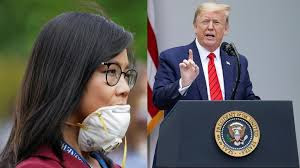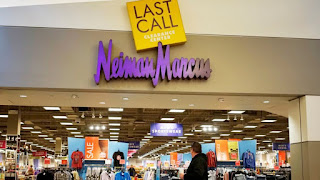TJX: A Positive Shopping (and Investment) Experience
Customers line up as TJ Maxx reopens
After many decades in the world of retail, I chose to restrict my personal investment in retail stocks to TJX. Let me explain why.
Having first invested in 2018, I was enjoying double-digit returns on my (modest) investment until COVID-19 dropped a nuke on the world of retail- especially brick & mortar.
TJX per share price today is -6.8% from 1 year ago, which represents a climb back of 37% from its nadir in March of this year. While TJX is expected to announce a significant drop in YOY sales and profits for Q1 2021, the stock today (5/20) is one of the best positive movers. Why? That kind of report usually drops the bottom out of a stock.
Industry consolidation? No kidding. JC Penney, J Crew, Neiman Marcus, Pier 1, more.
That in itself does not guarantee success for those who remain; in fact, it could be the Ides of March (Not a pun) for others. What the analyst is really thinking is that the business model, value proposition, historical management and shareholder performance is far superior to any other major retailer.
Personally, I believe that, within a year, barring unknown unknowns, that TJX share price will approach that of its pre-split level (100+ and it is 51 now, was as high as 65 before March). Why do I feel so strongly about this stock and why didn’t I bail out when the s**t hit the fan? Three main reasons:
*NOTE: (all numbers, business and policy information below derived from TJX FY 2020 Annual Report and Notice of Shareholder Meeting)
1. Financial Performance
Here are some of the numbers:
- Net Sales ($million): $30,945 1/30/2016; $41,717 2/1/2020
- EPS (Earnings Per Share): Just north of $.50 in 2010; $1.67 1/30/2016; $2.67 2/1/2020
- Cash dividends Per Share: $.42 1/30/2016; $.92 2/1/2020
- Net Income ($million): $2,278 1/30/2016; $3,272 2/1/2020 (% increase 7.3-7.8% of sales)
- 10 year CAGR (Compound Annual Growth Rate) vs. Peer Group Average and S&P 500 index= 22/13/14%
- An investment of $100 on January 30, 2015 would be worth almost $200 today, the S&P 500 would pay $175 and the Dow Jones Apparel Retailers Index would be about $130.
It is pretty clear that the entire retail world didn’t grow at this rate or return this well during the last 5 or 10 years. So what we have to conclude from the numbers is that, during this period, TJX has become MORE relevant to their customer’s lives where many others, such as those mentioned above and others not mentioned, like Macy’s, have become LESS.
So why has TJX done so well and why do I believe they will continue to do so? This despite the fact that TJX does not rely on ecommerce to deliver its business, leaning instead on the in-store shopping experience. Read on..
2. Business Model/Value Proposition
TJX calls its in store shopping experience “the Treasure Hunt.” All TJX employees, in store or buying/support, are unified and on the same page that this is how they should make the customer feel when they are in the stores.
TJX calls its merchandising style “opportunistic buying.” It is well known that TJX buyers are very sharp operators to find the best of the distressed, resulting in “a compelling value proposition of fashionable, quality, brand name and designer merchandise assortments more frequently than traditional retailers.” Cheaper, better faster- that is the way I remember we used to operate in the world of NYC department stores during the 1970’s. We had our “T-stands” with new fashion and test styles, but we were in the market every week without fail to search and push for bargains for our “rounders.” Traditional department stores have abandoned this style in favor of planned promotions (maybe a year in advance) and dizzying sale offers, which leaves them no money for opportunistic buying- assuming they knew it when they saw it.
The buying style, of course, is facilitated by what TJX calls their “Flexible Business Model”- buying and inventory management strategies, not buying up your spend way in advance, but leaving money for opportunities and planning for them to occur- having the merchandising ability and open-to-buy to always react. That is what we did years ago as well.
All of this skilled merchandising results in an exciting shopping experience.
This business model, as I mentioned, is not new; it is the Creed of the Merchant, as practiced by those who have become icons in the world of retail, such as Stanley Marcus and Mickey Drexler. And it keeps you relevant. After COVID-19, TJX will more than make up for the lost sales and momentum while stores had to be closed. It will FEAST on the megatons of great merchandise that was a casualty of retailers or manufacturers with leftover goods.
3. Management Compensation/Bonus Policy
Unlike other retailers recently, TJX does NOT pay for non-performance. Executive compensation is solidly based on short- and long-term performance: “directly tying incentive compensation to the achievement of objective performance metrics” and “Award limits on maximum plan payouts” and “Emphasis on long-term opportunities for equity and cash incentives;” it openly eschews the tricky gimmicks that have made retail executives obscenely rich as the ship is sinking, such as “No single-trigger benefits upon a change of control.” This last one alone has cost the retail customer billions.
There are pages and pages of details about executive compensation in the Shareholder’s Meeting document and the Annual Report, both of which are public.
The executive compensation plan pie chart sums up the policies:
a. almost 50% of compensation is based on PSUs (Performance Share Units)
b. Salary is 10-16% (CEO, NEO)
c. Long-term incentives are 74-71% of compensation
d. Performance metrics include Pre-Tax Income, Total Sales, EPS Growth, and ROIC (Return on Invested Capital); these are store-wide metrics which don’t favor one executive or another or the CEO.
4. Conclusion
Here’s the best part: TJX is not run like a cheapie discount store; it has been and is run like a department store with smart merchants, smart policies, and smart executives who are all together on one thing: Provide the best experience for your customer; they will spend and come back again and again because they know there are new “treasures” to be found.
That is my take on why TJX is a great shopping experience for its customer, and a great investment short and long term.
(News media carried pictures and videos of long queues to get in to TJX stores that reopened in the Southeast. Besides the health questions, which I am pretty sure they handled (or hope they did), this shows that people still have lots of open to buy for the right items at the right VALUE.















